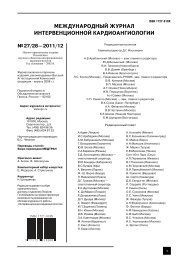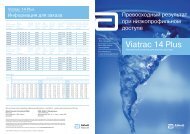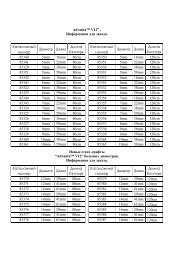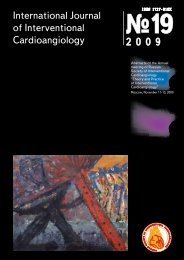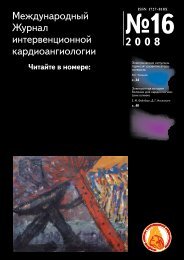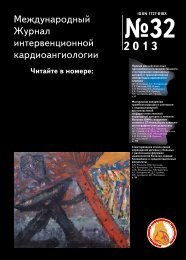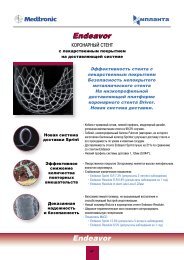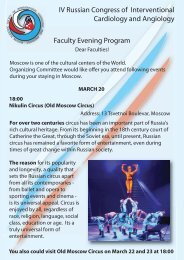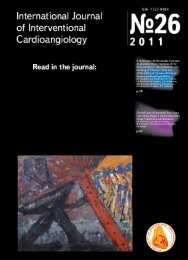International Journal of Interventional Cardioangiology
International Journal of Interventional Cardioangiology
International Journal of Interventional Cardioangiology
You also want an ePaper? Increase the reach of your titles
YUMPU automatically turns print PDFs into web optimized ePapers that Google loves.
MUSCELLANONEOUS<br />
Heterophil Anti-Cardiac Antibodies and Cardiovascular<br />
Changes in Children with Viral Infections<br />
M.G. Kantemirova 1,2 , Е.А. Degtyareva 2 , М.Yu. Tsitsilashvili 1 ,<br />
V.А. Аrtamonova 1 , N. Yu. Egorova 3 , O.N. Trosheva 2<br />
Peoples’ Friendship University <strong>of</strong> Russia, Russian State Medical University, Moscow, Russia<br />
1 - Peoples’ Friendship University <strong>of</strong> Russia, Department <strong>of</strong> Pediatric Diseases,<br />
Morozovskaya Children City Clinical Hospital, Moscow<br />
2 - Peoples’ Friendship University <strong>of</strong> Russia, Department <strong>of</strong> Pediatric Diseases, Children Clinical Infectious<br />
Hospital No.6 <strong>of</strong> the Department <strong>of</strong> Healthcare <strong>of</strong> the North Administrative District <strong>of</strong> Moscow<br />
3 - Russian State Medical University, Department <strong>of</strong> Pediatric Diseases<br />
<strong>of</strong> the Pediatric Faculty, Morozovskaya Children City Clinical Hospital<br />
Kew words: herpes infection, Epstein-Barr virus,<br />
cytomegalovirus, human herpes virus type 6, respiratory<br />
viruses, anti-cardiac antibodies to endothelium,<br />
conduction system, cardiomyocytes, smooth<br />
myocytes.<br />
Abbreviations<br />
DCMP – dilated cardiomyopathy<br />
IM – infectious mononucleosis<br />
EBV – Epstein-Barr virus<br />
CMV – cytomegalovirus<br />
HHV-6 – human herpes virus type 6<br />
HI – herpes infection<br />
ACAB – anti-cardiac antibodies<br />
AB – antibodies<br />
CTD – connective tissue dysplasia<br />
MCM – minor cardiac malformations<br />
ELISA – enzyme-linked immunosorbent assay<br />
PCR – polymerase chain reaction<br />
IFA – immun<strong>of</strong>luorescence assay<br />
ТIC – toxic and infectious cardiomyopathy<br />
Cardiovascular function disturbances during acute<br />
infectious diseases are observed in 50-95% patients,<br />
according to various authors' data; they are most common<br />
in patients with burdened premorbid grounds or<br />
cardiological family history (1, 2, 3). In most cases<br />
these changes are not permanent, however, the infections<br />
may cause myocarditis, pericarditis, endocarditis,<br />
heart contractile and conductive disturbances,<br />
and endothelial cell damage (4, 5, 6).<br />
It is known that viruses, especially enteroviruses,<br />
are the most cardiotropic ones. However, over the last<br />
years herpes viruses are considered more commonly<br />
as the causes <strong>of</strong> cardiovascular lesions in clinical<br />
1 Address for correspondence:<br />
Marina Kantemirova; Medical Faculty,<br />
Department <strong>of</strong> Pediatric Diseases;<br />
8, ul. Miklukho-Maklaya, 117198, Moscow,<br />
Tel.: (007 495) 2371851, 2364865<br />
E-mail:kantemirova60@mail.ru<br />
Manuscript received on October 10, 2008<br />
Accepted for publication on November 12, 2008<br />
practice. They are wide spread pathogens and, along<br />
with enteroviruses, are able to persist in the body for<br />
a long time. The role <strong>of</strong> herpes in development <strong>of</strong><br />
DCMP, coronary vasculitis, and early atherosclerosis,<br />
left ventricle dilatation and heart rhythm disturbances<br />
(4, 7, 8, 9, 10, 11, 12) is being investigated. The<br />
Herpes family viruses possess a number <strong>of</strong> properties<br />
that allow them to be a cause <strong>of</strong> chronic cardiovascular<br />
pathology with altered endothelial cells, smooth<br />
muscle cell proliferation, various immunopathological<br />
shift, including polyclonal humoral activation, morphological<br />
changes in the cardiomyocytes (13, 14, 15).<br />
The data appeared on possible role <strong>of</strong> the respiratory<br />
viruses in development <strong>of</strong> cardiovascular pathology,<br />
by direct cardiomyocytes damage associated<br />
with myolysis and increased levels <strong>of</strong> cardiotropic<br />
enzymes (16), by toxic or immune-mediated effects,<br />
involving the mechanisms <strong>of</strong> generalized inflammatory<br />
process (17) appeared<br />
The viral infection in children may result in persistent<br />
morphologic and functional changes in the cardiovascular<br />
system 3-7 times more frequently than<br />
in adults. Thus, biopsy performed in a multicenter<br />
study evaluating the efficacy <strong>of</strong> treatment for chronic<br />
myocarditis in children showed myocarditis to be a<br />
cause <strong>of</strong> DCMP in 30% patients, and in 4.3-10% <strong>of</strong><br />
adult patients (18, 19).<br />
One <strong>of</strong> potential mechanisms <strong>of</strong> cardiac structure<br />
damage in viral and bacterial infections may be an<br />
effect <strong>of</strong> specific and non-specific antibodies resulting<br />
in different heart function disturbances including<br />
dissociation <strong>of</strong> electromechanical myocardial<br />
coupling (20, 21). Increased titers <strong>of</strong> anti-cardiac<br />
auto-antibodies, heterophil anti-cardiac antibodies<br />
are observed not only in rheumatic patients but in<br />
patients with myocarditis, Kawasaki disease, cardiomyopathies,<br />
coronary heart disease, and myocardial<br />
infarction as well (22, 23).<br />
It has been shown that increased titers <strong>of</strong> anticardiac<br />
antibodies are observed not only during the<br />
ongoing inflammation but during myocardial dystrophy,<br />
myocardial remodeling <strong>of</strong> various genesis,<br />
Heterophil Anti-Cardiac Antibodies and Cardiovascular Changes<br />
in Children with Viral Infections<br />
45



